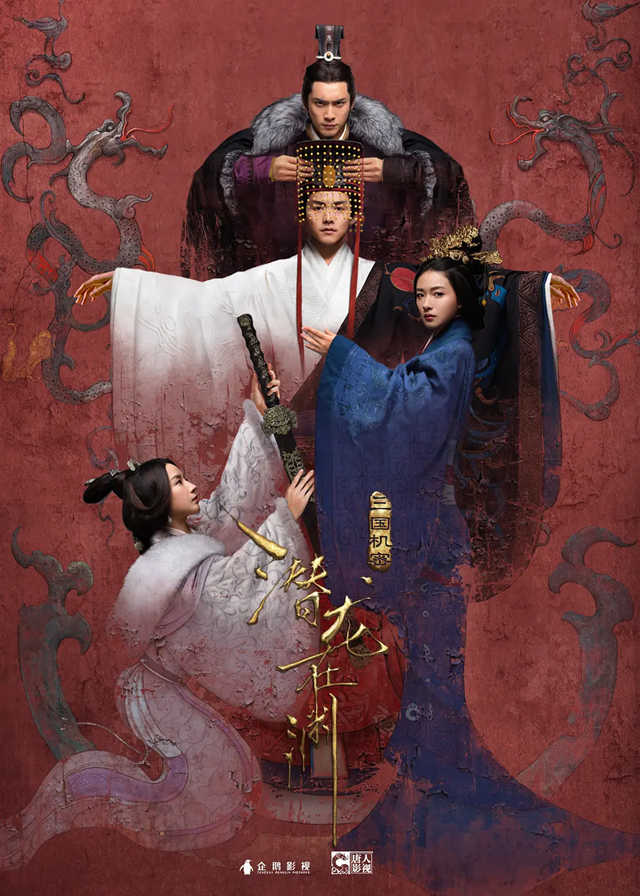Secret of Three Kingdoms Episode 54 (Ending) Recap
> Secret of Three Kingdoms Recap
Empress Cao Jie expressed her deep concern upon hearing that Liu Ping intended to fight her brother, Cao Pi, admitting she felt like the sister of a sinner and asking for punishment. Liu Ping gently raised her, reassuring her that it was not her fault and that he would never harm her, regardless of what transpired. He informed her of his plan to meet Cao Pi, who was heading south, to negotiate rather than fight.
Cao Jie offered to accompany him to confront her brother about defying their father's last wish, but Liu Ping declined, stating he knew what to say. Before he left, Cao Jie urged Liu Ping to visit Empress Fu Shou, confessing that she had known Fu Shou was alive for some time but had kept it secret to protect her from Cao Cao.
She added that she had ordered surveillance in the capital to cease after her father's passing, feeling guilty for having wronged Liu Ping and wishing for the couple to reunite quickly, though acknowledging it was not yet the right time for a public reunion. Liu Ping stood on the city wall, facing Cao Pi's formidable army.
He proposed a private discussion with Cao Pi, who, despite his officers' concerns about a trap, agreed to meet, asserting that Liu Ping was an enemy, but not a crook. Alone on the wall, Cao Pi revealed that before their father passed away, Cao Cao had wished to collaborate with Liu Ping for ten years to pacify and unify the nation, regardless of whether it was ruled by the Liu or Cao family.
However, Cao Pi admitted he lacked his father's magnanimity and vision, thus requiring more authority to fulfill his dreams, concluding that a battle for survival between them was inevitable. Liu Ping countered by analyzing the grim consequences of such a war, warning that a stalemate would allow the Shu and Wu kingdoms to exploit the situation, plunging the Central Plains into further chaos and rendering Cao Cao's life's efforts futile.
He challenged Cao Pi, asking if his desire for power stemmed from a genuine dream or mere ambition. Cao Pi, uncertain himself, confessed to spending his life seeking his father's trust and love, aspiring to prove himself more capable than his father and to fulfill Cao Cao's regret of not witnessing unification. He lamented that only the victor was qualified to save the nation.
Liu Ping remarked that such "salvation through killing" and "aspiration from wild desire" suggested Cao Pi hadn't truly found his aspiration. When Liu Ping questioned Cao Pi's certainty of victory, Cao Pi admitted he was not certain but declared he could die, yet could not be a loser, insisting on fighting to the death. Liu Ping sighed, urging Cao Pi to reflect on the Central Plains, which were gradually stabilizing.
He then declared that he would not fight this battle, for his goal was national unification, not the triumph of a single surname. He confessed his weariness from years of conflict and, to achieve peace, offered the empire to Cao Pi. Stunned, Cao Pi knelt, overwhelmed by Liu Ping's abdication. Down below, Cao Ren and his soldiers, witnessing Cao Pi kneeling, mistakenly believed he had admitted defeat.
However, when Cao Pi returned, he announced that Liu Ping had abdicated the throne and surrendered the empire. Cao Ren and his army erupted in cheers, hailing Cao Pi as the new Emperor. From the city wall, Liu Ping quietly watched the celebrations. He removed his imperial crown, feeling a profound sense of relief as the burden of emperorship lifted. He apologized to Jia Xu, feeling he had let him down.
Jia Xu, however, thanked Liu Ping on behalf of the people for his wisdom and courage. After bidding farewell to his officials, Liu Ping calmly departed from the great hall. As he descended the steps, the cloudy sky unexpectedly cleared, and sunlight bathed his face.
He informed Cao Jie that he had arranged with Cao Pi for her to retain the respect and status of an empress, regardless of where she chose to reside, deeming it the last thing he could do for her. Cao Jie, however, stated she never desired to be an empress and would return home to live with her mother, whom she deeply missed.
She wished Liu Ping and Fu Shou happiness and promised to visit them once they had settled down. Liu Ping acknowledged that he had let her down over the years. As they parted ways, they expressed relief that they could finally walk out of the "cage" of the palace. Upon exiting the palace gates, Liu Ping discovered Sima Yi waiting for him.
Sima Yi had come to see him off, revealing that he had anticipated Liu Ping's decision when he lent him the 300,000 Qingzhou soldiers, given their long-standing brotherhood. Liu Ping observed that Sima Yi's previous act was a dignified way for him to abdicate. Sima Yi elaborated that true national unification did not depend on the reign of a single surname.
Liu Ping explained that while he possessed the power to defeat Cao Pi, he could not entirely eradicate the Cao family, which would lead to renewed strife, negating the hard-won peace. He entrusted his accumulated forces to Sima Yi, expressing his desire for Sima Yi to use these resources to assist Cao Pi in pacifying internal conflicts and fending off invaders, thereby reassembling their fractured nation.
Liu Ping declared his own mission complete and stated that Sima Yi's conquest had just begun, urging him to enjoy the world's beauty on his behalf. As they prepared to part, Liu Ping asked if they would meet again, to which Sima Yi replied with a smile that they never truly bid each other farewell, before they rode off in separate directions. Liu Ping embarked on a bamboo raft, following the address Sima Yi had provided to find Fu Shou.
Amidst the serene green hills and clear waters, he eventually reached Sima Yi's secluded house. On the shore stood Fu Shou. Their eyes met across the distance, and they rushed towards each other, embracing warmly. Fu Shou, in disbelief, wondered if it was all finally over, but Liu Ping held her close, reassuring her that it had just begun.
Meanwhile, Cao Pi entered the imperial palace, gazing at the Dragon Throne and the Imperial Seal, tears of exhilaration streaming down his face as he realized his long-held ambition. Cao Jie confronted him, questioning why he had done what their father refused to do, reminding him that the Cao family would be branded as rebels and traitors in history.
Cao Pi, however, declared that he would write history now, intent on founding a new dynasty for the Cao family and bestowing the posthumous title of emperor upon his father. He asserted that he was more suitable to be emperor than Liu Ping. Cao Jie, disillusioned, threw the Imperial Seal to the ground, denouncing him as an emperor burdened by guilt and fear.
Cao Pi, incensed, retrieved the seal, clutching it wildly as he shouted his father's name into the empty air, convinced he had finally accomplished what Cao Cao could not, and proven himself. Cao Pi's old illness resurfaced, prompting a medical official to advise him to lead a calm life and recuperate, free from extreme emotions. Cao Pi scoffed at the suggestion, noting his impending coronation and the numerous internal and external enemies.
The official, pressed for a prognosis, reluctantly revealed that Cao Pi would only live for another ten years. Later, as Cao Pi played the zither in the courtyard, he lamented his limited time, reflecting on how he had finally achieved everything.
He pledged to give Zhen Mi the best of everything once he was emperor and painted a picture of their future life together in Luoyang, where he would build her a zither stage on water, and they would raise their children and enjoy quiet moments together. Zhen Mi, however, gently caressed his face, heartbroken.
She confessed that her past lover, the bright young man she once knew, who ran with her in Yecheng and played the zither by the corridor, was long gone. She declared that no emperor was truly free and that moving to Luoyang would merely imprison them in a larger cage.
With a heavy heart, she broke a string on his zither, urging him to remember her as she was and the zither's past sound, pleading for them to preserve some dignity as she departed. On the eleventh month of A. D. 220, Cao Pi formally accepted Emperor Xian's abdication and ascended to the throne, establishing the state of Wei, with Sima Yi among those celebrating his coronation.
Later, Fu Shou, now living a peaceful life with Liu Ping, reflected that in this world, only she would know what Liu Ping had truly done for the nation. She noted that history books would bear the names of his brother, Cao Cao, Cao Pi, Sima Yi, and even her own, but not Liu Ping's. Liu Ping found fortune in this anonymity, content that no one would pursue his name. Fu Shou, however, vowed to remember him always.
She lightheartedly added that the history books would claim she had been poisoned to death by Cao Cao. Seven years later, in A. D. 226, Wei Emperor Wen, Cao Pi, died at the young age of 39, having reigned for only seven years. The young Cao Rui ascended the throne, with Sima Yi, Chen Qun, and others appointed as regents. Sima Yi gradually consolidated power within the Wei Empire.
Over the next forty years, he and his descendants ultimately replaced the Wei dynasty with the Jin dynasty, finally ending the turbulent era of the Three Kingdoms and unifying the world once more. Years later, Sima Yi, traveling with the young emperor, recognized a middle-aged Liu Ping, now accompanied by a child, along the road. The two brothers, after a long separation, met again. The young emperor, unaware, inquired what Sima Yi was looking at, and Sima Yi simply replied, "The world."












